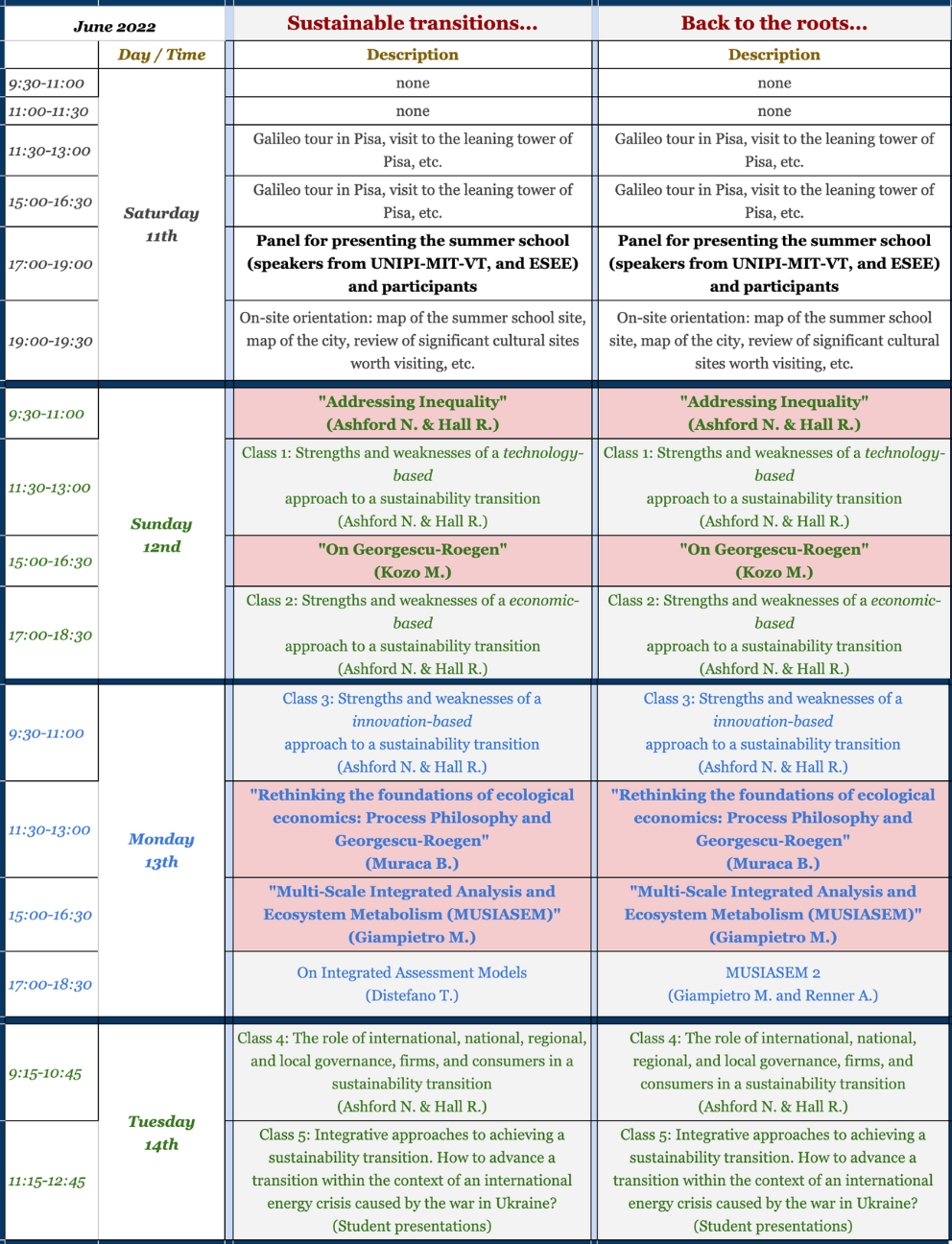Back to the roots of Ecological Economics
Sustainable transitions in employment, economic welfare and environment
Organizers
Dr. Ralph Hall, Virginia Tech, rphall@vt.edu
Prof. Nicholas Ashford, MIT, nashford@mit.edu
Dr. Tiziano Distefano, Università di Pisa, tiziano.distefano@unipi.it
Prof. Tommaso Luzzati, Università di Pisa, tommaso.luzzati@unipi.it
Description
The twentieth century saw enormous leaps and bounds in addressing various challenges pertaining to human development – e.g., rapid economic growth, the recognition of climate risks, poverty alleviation, better healthcare for many, addressing racial, gender, and religious inequities, etc. But the trends that have emerged over the past several decades now require society to confront the interlinkages among these challenges to achieve sustainable forms of development.
The critical need to tackle social and environmental challenges jointly has been made evident by the fast spread of the COVID-19 pandemic. On the one hand, scientists claim that deforestation, loss of biodiversity, and industrial animal production are among the main causes of the emergence of pandemics. On the other hand, unequal socioeconomic and occupational status, access to health care, nutritional status, and housing conditions determine an uneven distribution of risks from the COVID-19 pandemic. The COVID-19 pandemic has uprooted many commonly held beliefs around the way the economy should function, specifically with regards to the nature of work. It also provided a glimpse at how a radical decline of industrial output can result in significant environmental improvements. However, entrenched or captured political systems are likely to result in a rapid return to business and usual, unless the political and decision space is expanded to enable new ways of thinking to be heard and understood by stakeholders/citizens. Such a transformation calls for a deep understanding of the interlinkages among the social, economic, and environmental challenges to provide policy advice for a legitimate, fair, and evidence-informed transition towards sustainability.
This summer school will provide an updated analysis of these problems. We will consider the inter-relationship of global economic changes, inequality, employment, worker health and safety, and environment in the context of theories of economics, development, trade, technical and organizational innovation, and employment. Mechanisms for resolving the apparent conflicts between these elements will be explored. Moreover, we will consider new ways to explore the economic and environmental performance of specific policy scenarios necessary for the evaluation of possible synergies and trade-offs across these measures, grounded on system dynamics and ecological economics.
The summer school will combine lectures and group work with both a theoretical and an empirical perspective, focusing on analytical frameworks, research methods, and collective work. It will also include plenary sessions that introduce the thoughts of scholars who are considered to be the forefathers of ecological economics and the degrowth movement. Georgescu Roegen and his epistemology, based on process philosophy, will be central to these sessions.
Learning Objectives
Upon completion of this program, students will understand the founding epistemological and analytical tools of ecological economics, which will be used to explore current sustainability challenges and the recent concepts of postgrowth/degrowth. Students will be able to formulate their own perspective of sustainable development that is informed by existing and emerging theories and approaches, and develop realistic policies/strategies for the transition towards sustainable development.
Global Skills
Upon completion of this program, students will be able to engage in an international research conference, act in a professional and culturally appropriate manner, communicate effectively, and build a professional network.
Timetable


